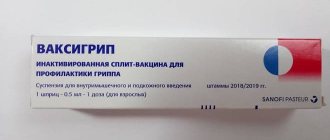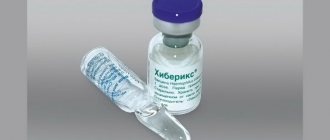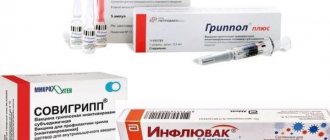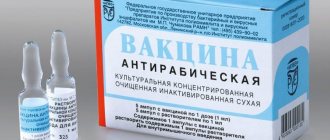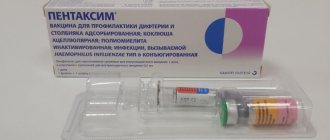Indications for use
According to the instructions, Vitagerpavak is intended to prevent the herpes simplex virus and prevent its relapse. Vaccination is used to activate cellular immunity, cleanse and restore the body.
Doctors recommend vaccination with Vitagerpavak for the following categories of patients:
- In case of chronic herpetic infection (with relapses three or more times a year);
- Elderly people (over 60-65 years old);
- Stages 1 and 2 HIV-infected patients before the onset of active AIDS symptoms.
How to live with herpes
- First of all, get ready to fight and defeat the infection. The attitude “I have herpes...” should be replaced with: “I am recovering from herpes!”
Of course, normalize the work and rest schedule, maintain personal hygiene, use hardening, and get vaccinated with Vitagerpavak. You can and should be vaccinated for all types of CGI; you can read more about treatment here. Moreover, with mild forms of CHI, you can get vaccinated immediately without special training (without general health-improving agents and probiotics). The antiherpetic vaccine “Vitagerpavak” is used, 5 injections with an interval of 7-10 days, after 6 months – a repeat course. And in cases of severe forms of CHI, like Olga’s, MANDATORY restorative treatment is required (for 1 month) and then vaccination (up to 3-4 courses over 2 years). This is what happened with Olga. She completed 1 course (monthly) of restorative treatment and 3 courses of revaccination. In parallel with drug treatment, I referred the patient for psychological help to Sense of Peace, where she was given a series of lessons on extinguishing the experiences of fear and shame that caused depression and alienation. Olga’s mood returned to normal and negative thoughts about herself and her future stopped; now her psyche did not interfere, on the contrary, it supported her recovery.
Contraindications
According to the instructions, Vitagerpavak is contraindicated in the following cases:
- Presence of cancer;
- Herpetic infection in the acute phase (vaccination should be carried out no earlier than 5 days after the disappearance of clinical symptoms, and for ophthalmic herpes - no earlier than a month);
- The presence of an allergic reaction to gentamicin or antibacterial drugs of the aminoglycoside group;
- Exacerbation of chronic diseases;
- Acute diseases of any etiology. Vaccination can be carried out no earlier than a month after recovery;
- Pregnancy.
Composition and mechanism of action
- active ingredients - virus-specific inactivated immunoantigens of HSV types I and II;
- auxiliary compounds represented by gelato, gentamicin sulfate, sucrose and formaldehyde.
Preservation of viral DNA in the preparation guarantees maximum activity of Vitagerpavak, expressed in stimulation of the cellular mechanisms of the body's resistance to these serotypes.
Clinical and virological studies demonstrate: antiherpetic vaccination triples or quadruples the specific reactions of T-lymphocyte immune memory, while at the same time maintaining B-cell antibody productivity at a high level. The body’s response to the first administration of Vitagerpavak is manifested by the correction of general immunity, reducing the degree of its damage by two or three times.
Thus, the prevention of relapses of herpetic disease during vaccination with Vitagerpavak is due to the equal stimulation of cellular specific protection and the general immunity of the body to foreign agents.
Directions for use and dosage
Vaccination with Vitagerpavak is carried out only in specialized institutions (dispensary, clinic, hospital) under the supervision of medical personnel. Before immunization, the patient must undergo a thorough medical examination with mandatory measurement of body temperature.
The Vitagerpavac vaccine is administered intradermally on the inner surface of the forearm.
Before using Vitagerpavac, one bottle of lyophilisate should be dissolved in 0.3 ml of sterile water for injection. For this purpose, a syringe with the collected solvent is inserted into the bottle, and the resulting mass is shaken until a homogeneous consistency is obtained.
A single dose of the solution is 0.2 ml. For herpetic infection affecting the skin and mucous membranes, it is recommended to undergo a course of vaccinations consisting of 5 injections, which are carried out at weekly intervals.
In the presence of a complicated infection with relapses occurring every 1-3 months, it is recommended to take breaks of 10 days.
Six months later, another course of vaccination is carried out, consisting of 5 injections.
Instructions for use
Composition: One vaccination dose (0.2 ml) contains: Active components: specific antigens of herpes simplex virus (HSV) types Ι and ΙΙ (strain “US” and strain “VN”, respectively), obtained by reproduction in transplantable cell culture African green monkey kidneys (VERO B), inactivated by formaldehyde and lyophilized with the addition of sucrose-gelatose medium as a stabilizer. Excipients: formaldehyde no more than 200 mcg/ml; gentamicin sulfate not more than 40 mcg/ml, sucrose not more than 0.075 g/ml; gelato not more than 0.01 g/ml. Purpose:
Prevention of relapses of herpetic infections caused by herpes simplex virus types I and II.
Method of administration and dosage: Vaccination is carried out in medical institutions as prescribed and under the supervision of a doctor. The vaccine is used in the remission stage, no earlier than 10 days after the complete disappearance of clinical manifestations of herpetic infection. The contents of the bottle are dissolved in 0.3 ml of solvent (sterile water for injection). To do this, the solvent is introduced into the vaccine vial using a syringe with a needle, which is then shaken until the contents are completely dissolved. The dissolved drug should be a slightly opalescent liquid of pink or pink with a yellow tint. There should be no visible mechanical inclusions. The dissolved vaccine cannot be stored. The drug is not suitable for use in bottles with damaged integrity, labeling, discoloration, expired, or improperly stored. Opening the bottle, dissolving the drug and the vaccination procedure are carried out in strict compliance with the rules of asepsis. The drug is administered intradermally into the area of the inner surface of the forearm in a single dose of 0.2 ml (control – formation of a “lemon peel”). The course of vaccination for herpes infection of the skin and mucous membranes consists of 5 injections, which are carried out with an interval of 7 days. For patients with complicated herpes infection (recurrences 1 or more times a month), the 2nd and subsequent injections are repeated with an interval of 10 days. After 6 months, a second course of vaccination is carried out (5 injections).
Side effects: After administration of the vaccine, individuals may develop local and general reactions. Local reaction: manifested by skin hyperemia with a diameter of up to 2 cm during the first day and a slight short-term burning sensation at the injection site. The general reaction can be expressed in a slight increase in temperature (not higher than 37.5 ° C), weakness, which goes away without treatment. If more pronounced local and general reactions occur or an exacerbation of a relapse of herpetic infection develops, the administration of the drug should be suspended. Vaccination can be continued 14 days after the clinical manifestations of herpetic infection and the general reaction to the vaccine have completely disappeared.
Interactions with other drugs: No cases of incompatibility with other drugs have been identified.
Contraindications:
1. Herpetic infection in the active stage (relapse). Vaccination is carried out no earlier than 14 days after the disappearance of clinical manifestations. 2. Acute infectious and non-infectious diseases. Vaccination is carried out no earlier than 30 days after recovery. 3. Chronic diseases in the stage of exacerbation or decompensation. 4. Malignant neoplasms. 5. Pregnancy. 6. Allergy to gentamicin and other aminoglycoside antibiotics.
Side effects
The use of Vitagerpavac is well tolerated by patients in the vast majority of cases, and side effects are rare. In some cases, vaccination may cause the development of local and general reactions.
Local reactions to the administration of Vitagerpavac are expressed in skin hyperemia, most often during the first day after vaccination. Along with swelling, redness and a burning sensation may occur at the injection site.
General reactions to the administration of Vitagerpavac are expressed in a slight increase in body temperature and general weakness of the body. As a rule, these reactions go away on their own and do not require additional treatment.
If significant local or general reactions occur as a result of using Vitagerpavac, further vaccination should be stopped and contact a medical facility. Further vaccination can be continued only after the complete disappearance of all local or general reactions.
Getting pregnant with herpes - pros and cons
Is herpes dangerous during pregnancy?
- probably one of the most common questions asked by women when visiting a doctor. Of course, the presence of HSV infection requires more careful examination and monitoring of such patients. With GG (genital herpes), damage to the placenta and fetus can occur at any stage of pregnancy and lead to malformations, immunodeficiency states and fetal death, miscarriages, premature birth due to severe changes in all three membranes of the placenta and umbilical cord vessels. Intrauterine HI is an uncontrollable cause of perinatal mortality, morbidity and early childhood disability. The importance of the problem is due to the fact that HSV, unlike other infectious diseases, has a destructive effect on the tissues and organs of the fetus. A study before IVF in women with HSV showed a more than 2-fold decrease in the ability of the embryo to implantation compared to healthy women
special instructions
The ready-to-use Vitagerpavak solution is a slightly opalescent pink liquid.
If the drug was stored in bottles with damaged integrity, labeling, or a change in its color is observed (in case of improper storage), it is not suitable for use.
The dissolved vaccine cannot be stored and must be used immediately after preparation.
Opening the bottle and dissolving the lyophilisate should be carried out in compliance with the rules of asepsis.
Description of the drug
The Vitagerpavac vaccine is a lyophilisate of specific antigens of the herpes virus serotypes 1 and 2. The following are used as excipients:
- formaldehyde;
- antibiotic Gentamicin;
- sucrose;
- gelato.
Vaccine antigens stimulate a specific immune response and the activity of lymphocytes in patients.
It remains in this form for several months after use. The Russian drug Gerpovax has a similar composition; its manufacturer is the St. Petersburg Research Institute of Vaccines and Serums.
The Gerpevac vaccine is available in a package of 5 bottles, each of which contains one single dose of 0.2 ml of medicine. It is in dry form; before injection, the lyophilisate is diluted without violating the sterility of the bottle.
Prevention of Varicella Zoster in children
The American vaccines described above are generally used to vaccinate patients over 50 years of age.
Young people, as well as children, are offered the drug Varivax as an alternative as a method of preventing Human herpesvirus 3.
Varivax is a vaccine intended for active immunization of children 12 months and older.
Directions for use: Varivax is administered in the form of 0.5 ml by subcutaneous injection into the outer shoulder or thigh area.
These are the most optimal areas for administering such drugs.
Intramuscular or intravenous administration of the vaccine is not recommended.
The vaccine is intended for subcutaneous administration only.
Evidence suggests that inadvertent intramuscular administration of Varivax, while not increasing side effects, does produce a short-term immune response.
Viravax is not recommended for use in patients who are hypersensitive to gelatin or neomycin.
The vaccine is also contraindicated in cases of active febrile infection, tuberculosis, immunodeficiency, and leukemia.
Immunosuppressive therapy and pregnancy are also contraindications to the administration of the drug.
Like other known vaccines, Virovax cannot provide 100% protection for all patients against naturally acquired Human herpesvirus 3.
But, nevertheless, it showed impressive results in research.
Clinical trials assessed efficacy 6 weeks after a single dose in individuals under 12 years of age and 6 weeks after a second dose in older patients.
In the first case, the effectiveness of the vaccine was 86%, in the second - 98%.
Vaccination may be considered as a preventive method for patients with immunodeficiencies.
When the benefits outweigh the risks (eg, asymptomatic HIV, IgG deficiency, congenital neutropenia, chronic granulomatous disease).
If it is impossible to vaccinate with Virovax, in Russian pharmacies it is possible to purchase an analogue of the drug Varilrix.
The composition of the vaccine is absolutely identical; the medicine is produced in the UK.
British vaccines are distinguished by their effectiveness and reduced risk of side effects.
Contraindications to the use of herpes vaccines
Like any medications, vaccines have their own indications for use and contraindications.
Zostavax and Shingrix are not prescribed to patients with the following conditions:
- ARI/ARVI (respiratory diseases)
Any respiratory disease (including open tuberculosis) or other active infections that are accompanied by fever are a contraindication for vaccination.
The vaccine can be administered to patients with an extremely mild course of acute respiratory infections/ARVI, which are not accompanied by severe symptoms.
The decision to delay vaccination depends on the severity of symptoms and the etiology of the disease.
- Immunodeficiency
Vaccination is not carried out for patients with severe forms of immunodeficiency:
- acquired immunodeficiency syndrome (AIDS)
- Bruton's disease (agammaglobulinemia)
- human immunodeficiency virus (HIV)
- hypogammaglobulinemia
- IgA deficiency
- severe combined immunodeficiency (SCID)
- neoplastic processes
In addition, vaccination is not prescribed to patients undergoing chemotherapy and treatment with corticosteroid drugs.
- Pregnancy
Vaccination with Zostavax and Shingrix is contraindicated for use during pregnancy.
The main reason is the lack of adequate studies that could show the effect of drugs on the fetus and the ongoing pregnancy.
- Breastfeeding (lactation)
The manufacturer recommends that vaccination be prescribed to patients during lactation with extreme caution.
Many experts recommend avoiding vaccinations during breastfeeding or temporarily stopping breastfeeding.
Nothing is known about the possibility of the active ingredients passing into breast milk.
- Hypersensitivity to gelatin and neomycin
The vaccines do not contain preservatives, but do contain residual amounts of neomycin.
Therefore, these drugs are not recommended for use in patients with hypersensitivity to neomycin.
Also not recommended for patients allergic to gelatin.
Intramuscular or intravenous administration of smallpox vaccine is not recommended.
The vaccine is intended for subcutaneous administration only, preferably in the shoulder area.
Storage
Vitagerpavac should be kept in a place where children cannot reach it. The optimal temperature for preserving it is from 2 to 8 C. Freezing is prohibited. Transportation is allowed at temperatures from 9 to 18 C, but not longer than three days. The drug is valid for two years. After opening the bottle, it must be used immediately.
The Vitagerpavac vaccine is needed because its administration can achieve the following results:
- Reduce the frequency and duration of relapses of protracted herpesvirus infection (CHI):
- Achieve deep remission of the disease;
- Form long-lasting cellular immunity;
- Completely interrupt relapses in 63% of patients.
Popular Multicomplex vaccine Infanrix IPV against infections
Today, vaccination against herpes is the only way to achieve deep remission.
